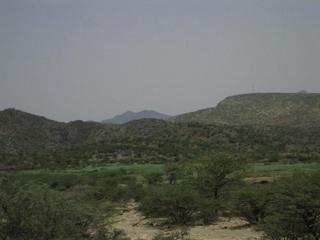the sea of berbera
 Weeks in Hargeisa can be long and exhausting. So, what better can one do to take a break then joining the beach of berbera for a weekend?
Weeks in Hargeisa can be long and exhausting. So, what better can one do to take a break then joining the beach of berbera for a weekend?Gesagt getan, rein ins auto, and on we went on the long and bumpy road towards berbera. A friend of mine, Olaf from Germany (there is also a ralph and a ulf and a alfred from germany living in this city - somehow they managed to combine the worse german names in this town ;-) has been here for the last five years, trying to fix that road between berbera and hargeisa. He's leaving in three weeks, since the road is ok now (if we dont count the bumps and potholes every ten meters). Today I asked him how he feels about the future of the road. Which future? According to him, in six months from now it will be just in the same condition as it was when he reached somaliland five years ago. Welcome to somaliland!
but anyway, thats not the story which i want to tell you now. I will rather give you an idea about the NICE sides of Somaliland. The worse i rather write you in an email - otherwise you might not visit my site again...
Late in the evening we reached Berbera. Or better the sea, than the salty water was actually the first thing I
 touched after jumping out of the car. Thousands of sparkels turned up around me, and at one point i had difficulties separeting the stars from the phosphorising plancton of the water. Water was also the thing which I continued to touch over the next 24 hours. Aber genug der worte, pictures might give you a better impression of what berbera is all about:
touched after jumping out of the car. Thousands of sparkels turned up around me, and at one point i had difficulties separeting the stars from the phosphorising plancton of the water. Water was also the thing which I continued to touch over the next 24 hours. Aber genug der worte, pictures might give you a better impression of what berbera is all about:
For instance
sunken vessels,
reminding home
sick "westlers" -
in this case Sandra,
of the remoteness
of this place.
Little pirates trying to drag me into their boat...
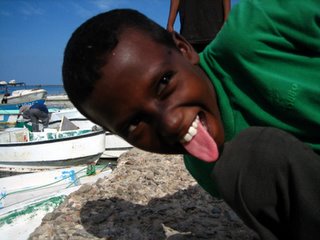
...and some semi friendly kids who were very much interested to see their tounge in the screen of my digi cam.
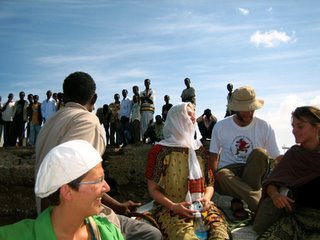 Jointly agreed on trusting the father of the little pirate instead. For ONLY fourty dollars they offered us a romantic boattrip in their fishing boat. Tens of people whatched us leaving the port - what was going on in their mind? Thoughts of pirates waiting for a now load of wazungus? Thoughts on whether tourism could become one of their future income sources? Who knows...
Jointly agreed on trusting the father of the little pirate instead. For ONLY fourty dollars they offered us a romantic boattrip in their fishing boat. Tens of people whatched us leaving the port - what was going on in their mind? Thoughts of pirates waiting for a now load of wazungus? Thoughts on whether tourism could become one of their future income sources? Who knows...Piratism is in any case a more realistic income than tourism.

Neverthless our skipper tried to be a good tour guide (or a clever one?) and promised us dolphins, sharks and lots of other fish.
After reaching the beach safe again i can say that the smell of rotten fish was the only thing accompanying us throughout the trip.
- no dolphins, no sharks, and more than all:
NO FISH! As much as oscar from sweden (he should know how to catch fish, shouldnt he?)
 tried, no fish was attracted by his rode.
tried, no fish was attracted by his rode.Gwenn gave up quickly his ambitions to catch some fish for lunch and tried to look at the situaton from the green peace perspective.
...should i climb or should i not?
After giving it some thoughts he decided to keep his narrow place in our tiny boat for the meantime and join greenpeace later on.

And instead of saving innocent sea animals, we bought and ate them.
for the first time in my life i saw oysters as big as a plate. It took the cook of the restaurant an hour to open them...
Ich selbst habe allerdings meine Haelfte dankend abgelehnt. Der Anblick allein hat mir den appetit aufs erste verdorben.

And how did the weekend come to an end?

Mit ein paar melancholischen Blicken Richtung Horizont, der kalaschnikov fest im griff, und einer partie bocce am strand.
Se la vi! Berbera, ich gehe, aber ich komme wieder!







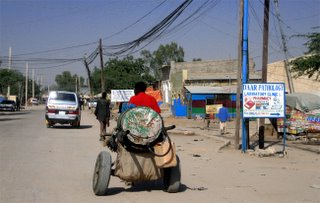










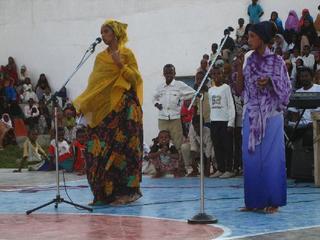

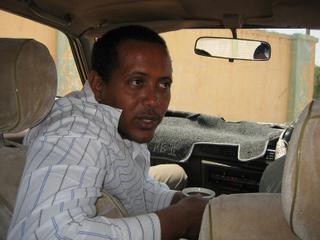 Ahmed and the ethiopian coffee... There is no better way to improve the working atmosphere!
Ahmed and the ethiopian coffee... There is no better way to improve the working atmosphere!

